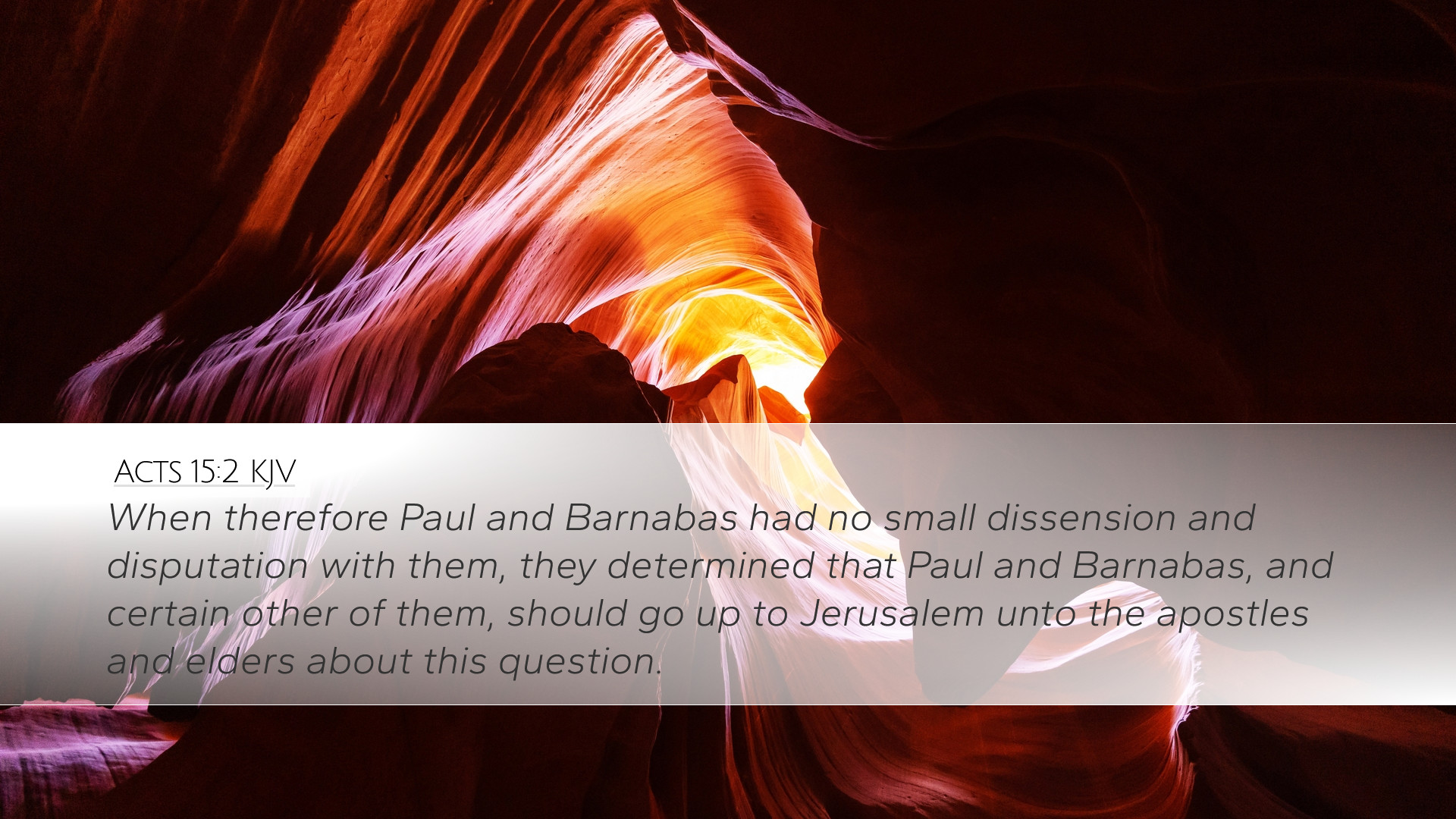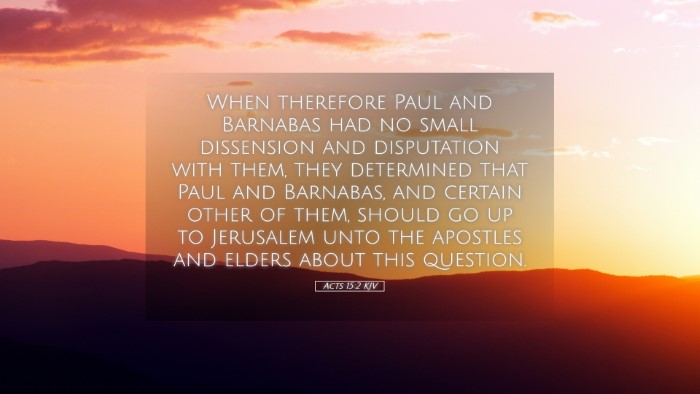Acts 15:2 Commentary
Verse: "When therefore Paul and Barnabas had no small dissension and disputation with them, they determined that Paul and Barnabas, and certain other of them, should go up to Jerusalem unto the apostles and elders about this question."
Introduction
The fifteenth chapter of Acts marks a critical juncture in the early church, dealing with the matter of whether Gentile believers should be required to follow Jewish law, particularly the practice of circumcision. This verse highlights a significant moment of contention between Paul and Barnabas and certain believers from Judea. Understanding this discourse allows for a greater comprehension of theological disputes and the unity within the diverse body of Christ.
Contextual Analysis
The context surrounding Acts 15:2 is instrumental in assessing the growing pains of the early church. The spread of the gospel to the Gentiles was met with both excitement and trepidation. The mission of Paul and Barnabas had yielded fruitful results, yet it also prompted debates about the nature of salvation and the inclusion of Gentiles into the community of faith. As observed by Matthew Henry, this situation reflects the “no small dissension” that points to the fervor with which early believers defended doctrinal integrity.
Interpretation by Public Domain Commentaries
-
Matthew Henry:
Henry interprets this verse as a demonstration of the growing tensions within the early church, due to the collision of Jewish traditions with the new Christian doctrine. He emphasizes that Paul and Barnabas' commitment to the truth of the gospel resulted in their decision to seek counsel from the apostles and elders. It is essential to note that the phrase “no small dissension” indicates a serious concern regarding the integrity of the faith.
-
Albert Barnes:
Barnes provides insight into the nature of the dispute, suggesting that it was not merely an academic debate but one that had real consequences for the practice of faith among believers. He highlights that Paul and Barnabas did not act hastily but rather with a measured approach by seeking the consensus of the church's leaders, illustrating the importance of unity and godly counsel in addressing doctrinal issues.
-
Adam Clarke:
According to Clarke, the involvement of Paul and Barnabas in this deliberation underscores the authority and value of the apostolic community. Clarke notes that their journey to Jerusalem wasn't only about resolving a conflict but also about safeguarding the principles of grace and faith that are foundational to the gospel. The approach taken by Paul and Barnabas serves as a model for contemporary church disputes and theological disagreements.
Theological Insights
This verse invites a deeper theological reflection on several key themes:
-
The Nature of Disputes:
Disputes in the church are not uncommon, and Acts 15:2 presents a model of how to engage in such disagreements. Rather than resorting to division, Paul and Barnabas exemplified a commitment to resolving issues through dialogue and seeking wisdom from church leaders.
-
Authority in the Church:
The decision to present the matter to the apostles and elders reflects a hierarchy and respect for authority within the early church. It underscores the necessity of leadership in discerning theological truths and maintaining unity among diverse groups.
-
Grace vs. Law:
The crux of the dispute centers around the relationship between grace and the law. The early church was wrestling with the implications of the gospel—whether faith in Christ alone was sufficient for salvation, or if adherence to the law was necessary. This debate continues to resonate within church circles today.
Historical Context
Understanding the historical backdrop of this verse is crucial. The early church was composed of diverse groups including Jews who had deep-rooted traditions and Gentiles who were new to the faith. This cultural clash brought about tensions that needed to be addressed thoughtfully and carefully. According to Matthew Henry, this significant chapter encapsulates the pivotal moment when the church collectively charted its theological course in view of Christ’s teachings.
Application for Today
For pastors, theologians, and students of the Bible, Acts 15:2 serves as a poignant reminder of the necessity for dialogue and mutual respect in the face of disagreement. The endeavor to reach a consensus among believers is commendable and essential for the health of the church. The unity of the body of Christ is paramount, and this passage encourages contemporary believers to engage in meaningful disputes while holding fast to the core tenets of the faith.
Conclusion
Acts 15:2 is a verse rich with practical and theological implications. The resolve of Paul and Barnabas to address the dispute concerning Gentile believers showcases an early example of the church’s desire for unity and the pursuit of doctrinal purity. The insights drawn from notable public domain commentaries illuminate the challenges and processes of theological reflection within the church that are as applicable today as they were in the first century.


